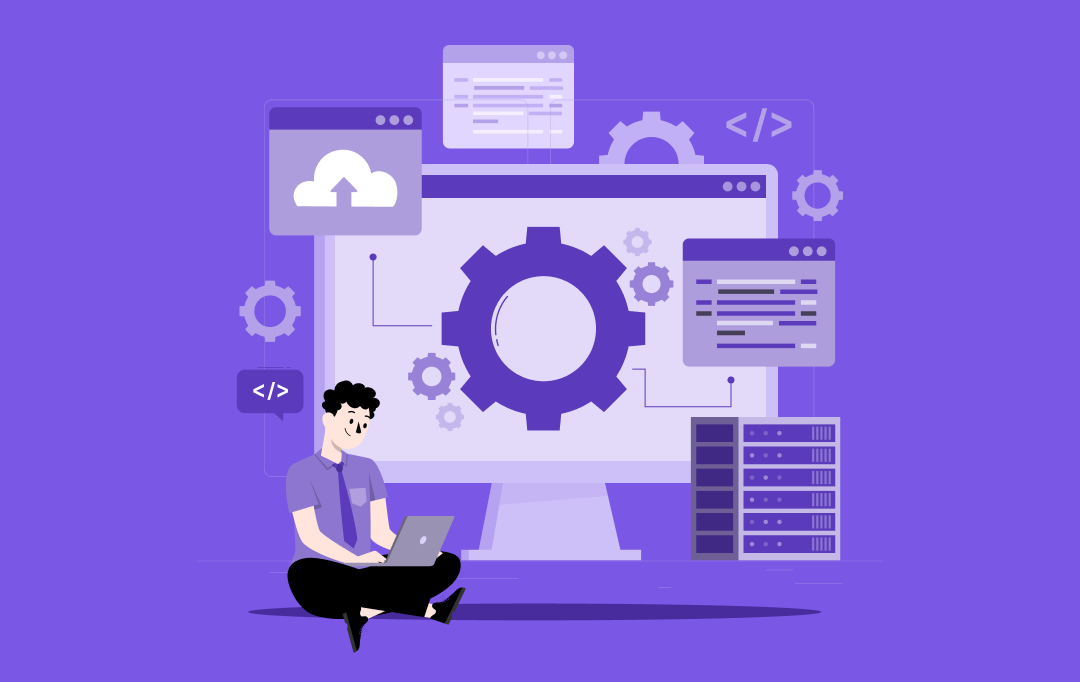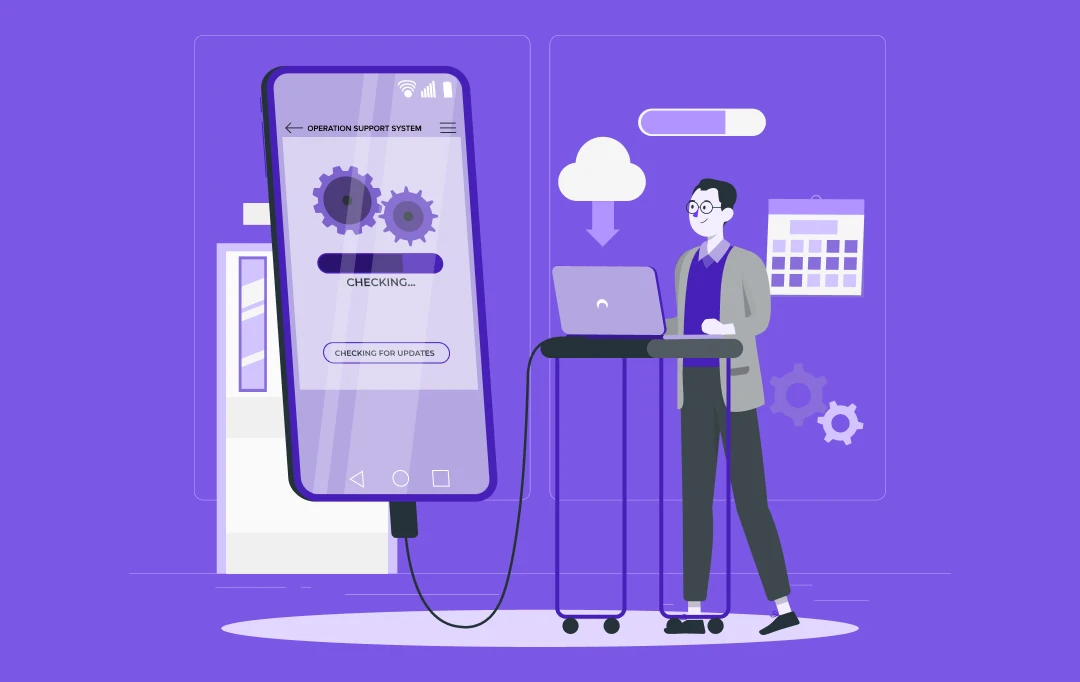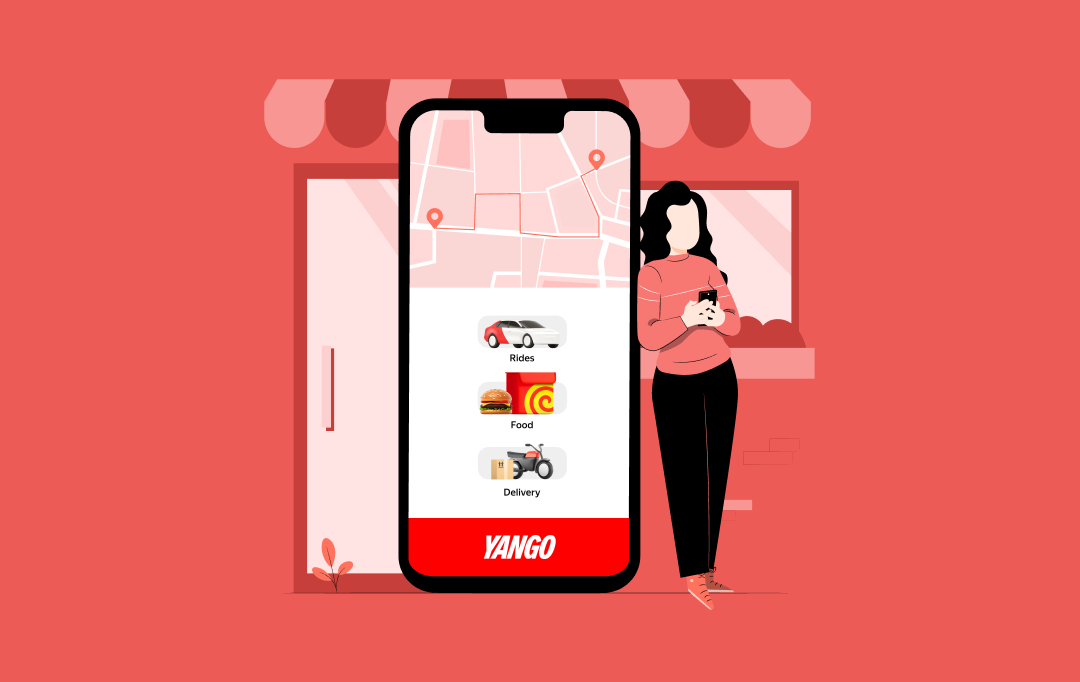Technology is evolving faster than your favorite Netflix binge, and this unprecedented tech exposure makes hybrid app development the golden middle ground. Embracing hybrid app development is like getting the perk of both native and web apps without going heavy on the pocket. Before hiring a game, let’s get a grip on the cost of hiring a hybrid app developer.
In this blog, we’ve covered every aspect—hourly rates, hidden charges, factors affecting the cost of hiring, and tips for optimizing costs.
The cost of hiring a hybrid app developer can vary significantly based on factors like expertise, location, and project complexity. Let’s explore the various elements contributing to this investment and what you should consider when budgeting for your app development journey.
Choosing the Most Effective Hiring Model for Your Needs
Different tips for hiring hybrid mobile app developers come with unique advantages and challenges, allowing businesses to align their approach with project requirements. Let’s explore these models holistically to determine the best fit for your goals and growth.
A. Inhouse, Outsourcing, Freelancers
B. Outstaffing vs. Full Outsourcing vs. Dedicated Development Teams
Inhouse, Outsourcing, Freelancers
When hiring, you can opt for in-house teams for full control and seamless collaboration, outsourcing for access to specialized expertise and cost-efficiency, or freelancers for flexibility and short-term commitments. Each approach offers distinct advantages depending on your project needs and budget. Let’s explore!
In-House Development
In-house development involves building and maintaining a development team within your organization. This team focuses solely on your projects, giving you complete control over the process when you hire hybrid mobile app developers.
Pros:
- Complete control over the project.
- Easy collaboration and communication.
- Aligned with company culture and long-term goals.
Cons:
- High operational costs (salaries, tools, training).
- It is time-consuming to hire remote hybrid app developers and onboard skilled employees.
- Limited expertise in niche or advanced projects.
Outsourcing
Outsourcing involves hiring an external company or agency to handle hybrid mobile application development tasks. It’s a flexible and scalable option for accessing global expertise.
Pros:
- Cost-effective compared to in-house.
- Access to a wide pool of talent and expertise.
- Scalability to meet varying project needs.
Cons:
- Potential communication gaps due to different time zones.
- Limited control over the hybrid mobile application development process.
Outstaffing vs. Full Outsourcing vs. Dedicated Development Teams
Understanding the differences between outstaffing, full outsourcing, and hiring dedicated development teams is crucial to aligning your business goals with the right approach. Each model offers unique control, scalability, and resource management advantages—let’s explore each to determine the best fit for your project needs.
Outstaffing
Outstaffing allows businesses to hire external developers who work as part of their in-house team while the outstaffing agency manages HR and administrative tasks. It offers flexibility in scaling resources without long-term commitments.
Pros:
- Greater control over the development process.
- Cost-efficient compared to hiring in-house teams.
- Access to skilled developers without administrative overheads.
Cons:
- Requires strong in-house project management.
- Potential communication challenges between internal and external teams.
Full Outsourcing
Full outsourcing involves hiring an external agency to handle the entire hybrid mobile application development process. This model is ideal for companies looking to save time and focus on core business operations while experts manage development.
Pros:
- Experts with minimal involvement handle complete projects.
- Ideal for businesses lacking technical expertise.
- Fixed pricing for defined projects ensures budget predictability.
Cons:
- Limited control over the development process.
- Success depends heavily on the agency’s reliability and communication.
Dedicated Development Teams
A dedicated development team is an exclusive group of professionals hired to work on your project long-term. This model is suited for complex or ongoing projects requiring consistent expertise.
Pros:
- High commitment and focus on your project.
- Combines the benefits of in-house and outsourcing models.
- Flexibility to adjust team size based on project needs.
Cons:
- More expensive compared to outstaffing.
- Onboarding and aligning with company practices may take time.
How Much Does It Cost to Hire a Hybrid App Developer?
Hiring hybrid app developers is a strategic and holistic methodology that requires a careful evaluation of various factors related to the cost to hire a hybrid app developer. These include the developers’ expertise, the complexity of the project, the development framework chosen, the timeline for delivery, ongoing support, and maintenance.
Let’s comprehend the cost to hire remote hybrid app developers.
Cost Variations Across Hiring Models
Building an in-house team involves salaries, benefits, training, and infrastructure costs. While this model ensures full control and direct communication, it is often expensive.
The hourly rate for in-house hybrid app developers ranges from $50 to $100.
Outsourcing to a professional development company provides access to experienced teams and advanced resources without long-term commitments.
This model is cost-effective, with hourly rates typically between $30 and $80, depending on the region and expertise.
Hiring freelancers offers flexibility and lower upfront costs, but it may come with risks, such as inconsistent quality or limited availability.
Freelancers usually charge between $25 and $50 per hour, making it the most affordable option but with varying reliability.
Key Factors Affecting the Cost of Hiring a Hybrid App Developer
When hiring hybrid app developers, several key factors influence the overall cost of the development process. These factors determine the project’s complexity and required skill set, which can significantly affect pricing. Here’s an overview of the most important considerations:

Developer Skill Level and Experience
Developers with more experience and specialized skills in hybrid app development can handle more complex challenges and deliver superior results, often justifying their higher rates. Their ability to troubleshoot and optimize app performance can significantly impact the cost to hire a hybrid app developer, leading to fewer revisions and faster project delivery.
Project Complexity
The more complex the app, the more effort, time, and specialized knowledge it requires. Advanced features like real-time data processing, multi-platform integrations, or custom UI/UX designs increase both the development time and cost to hire a hybrid app developer. Such complexity demands experienced developers proficient in the tools and frameworks to execute the project successfully.
Team Composition: Freelancers vs. Agencies
Freelancers generally offer lower hourly rates since they have fewer overhead costs than agencies. However, agencies provide additional benefits, such as access to a full development team, dedicated project management, and quality assurance processes, ensuring more streamlined workflows and higher-quality outputs, which may justify their higher fees.
Duration of the Project
The project’s duration can influence the cost to hire a hybrid app developer, as longer projects allow for negotiations on bulk rates or lower monthly costs. However, tight deadlines or urgent project timelines can increase costs due to the need for additional resources, expedited work, or overtime to meet the target date, which may require a premium on hourly rates.
Geographical Location
The cost to hire a hybrid app developer varies widely based on their geographical location. Developers in North America or Western Europe typically command higher fees due to local market conditions and living expenses.
On the other hand, offshore or nearshore developers in regions like Eastern Europe, India, or Southeast Asia offer more affordable rates while still providing quality hybrid app development services. However, this often comes with communication and time zone management challenges.
Technology Stack
The importance of hiring a hybrid mobile app developer lies in their expertise with technologies like Flutter or React Native, which require specialized skills and training.
The more specialized the technology stack, the higher the cost of hiring developers who are proficient in those tools, as their skill sets are often in high demand for cutting-edge, cross-platform development projects.
Market Demand for Hybrid App Developers
In a competitive job market, the impact of hiring a hybrid mobile app developer is often reflected in higher rates, especially when demand outpaces the supply of skilled professionals.
Trends in app development and the popularity of hybrid frameworks also influence this demand, meaning that businesses must be prepared to pay more during high-demand periods or when seeking top-tier talent.

Must-Have Expertise for Hiring Top Hybrid App Developers
When hiring hybrid app developers, assess their expertise in key areas such as app performance optimization, version control, testing, and debugging. These essential skills are critical to ensuring the development of a high-performing and reliable app. Explore why these skills are important in creating an effective and seamless app experience.
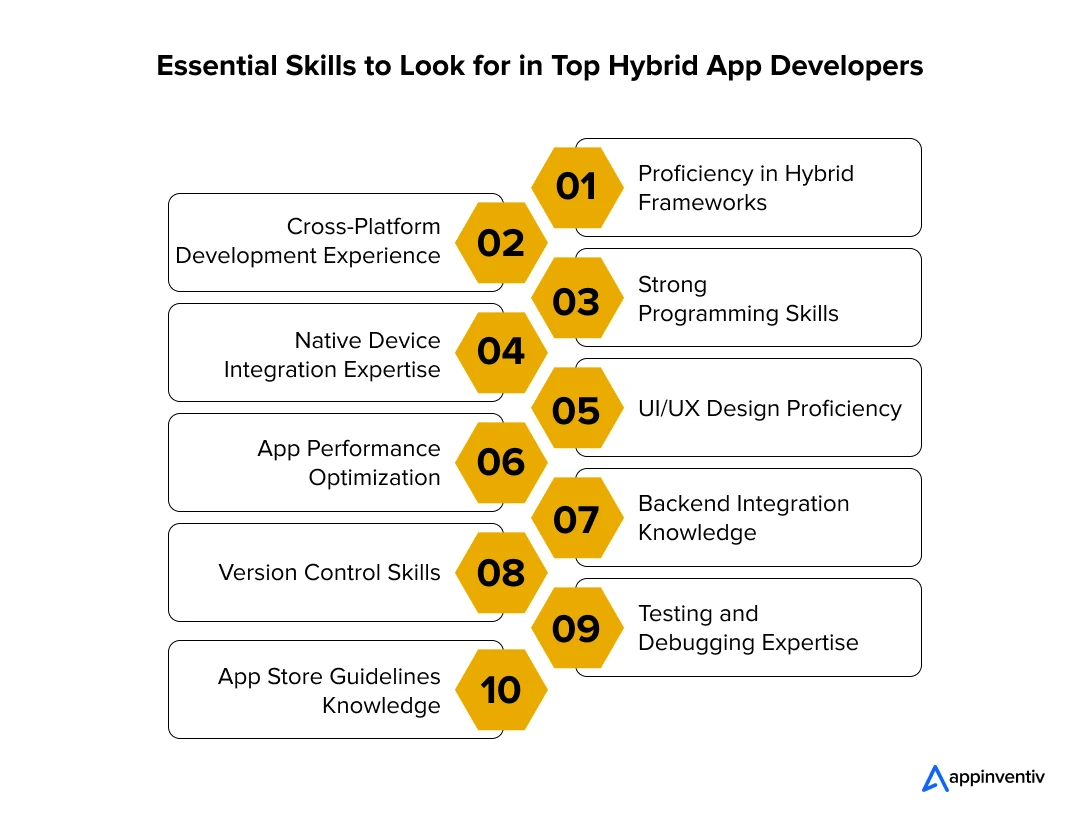
Proficiency in Hybrid Frameworks
Expertise in leading hybrid frameworks like Flutter, React Native, or Xamarin is essential when hiring hybrid app developers. Developers should know how to leverage these frameworks’ libraries, tools, and widgets to deliver native-like performance.
This proficiency also ensures faster development cycles and reduces maintenance efforts across platforms, ultimately impacting the cost of hybrid app developers by increasing efficiency.
Cross-Platform Development Experience
Developers with extensive cross-platform experience can create apps that run seamlessly on iOS and Android, ensuring consistent functionality and user experience. They can effectively address platform-specific quirks and optimize the app for various screen sizes and resolutions. This expertise is vital for maximizing audience reach while keeping costs low.
Strong Programming Skills
Proficiency in programming languages like JavaScript, Dart, or C# is crucial for implementing complex app functionalities. Developers should also be familiar with object-oriented programming, modular design, and clean coding practices. These skills enable the creation of efficient, scalable, and easy-to-maintain apps.
Native Device Integration Expertise
Developers should understand how to integrate native device features such as GPS, camera, accelerometer, and push notifications. This expertise ensures the app can effectively leverage device-specific capabilities, enhancing the user experience. Proper integration also reduces compatibility issues across platforms.
UI/UX Design Proficiency
Developers must be familiar with design principles to create visually appealing and user-friendly interfaces. They should be adept at crafting designs that align with platform-specific guidelines while maintaining a cohesive look and feel. A focus on intuitive navigation and accessibility ensures high user satisfaction and retention.
App Performance Optimization
Developers should have the skills to optimize app performance by reducing load times, minimizing memory usage, and ensuring smooth animations. They must be capable of identifying performance bottlenecks and applying fixes proactively. This ensures the app remains responsive and provides a top-notch user experience.
Backend Integration Knowledge
A solid understanding of backend systems, APIs, and databases is vital for connecting the app with essential services. Developers should be skilled in creating secure and efficient communication between the front end and backend. This ensures features like user authentication, data storage, and real-time updates function seamlessly.
Version Control Skills
Proficiency in version control tools like Git is essential for managing and collaborating on code efficiently when you hire hybrid app developers. Proficient developers must be able to track changes, resolve conflicts, and maintain a clean codebase. These skills are critical for ensuring smooth teamwork, especially in multi-developer environments.
Testing and Debugging Expertise
Developers should be adept at testing and debugging to ensure the app is free of bugs and runs flawlessly. They must be familiar with automated and manual testing techniques to identify and resolve issues at every development stage. A focus on quality assurance ensures the app meets performance and reliability standards.
App Store Guidelines Knowledge
A thorough understanding of the Google Play and Apple App Store submission guidelines is crucial. To avoid app rejections or delays, it is crucial to hire hybrid app developers who can ensure your application adheres to all necessary compliance requirements and guidelines. This expertise helps streamline the app launch process and ensures timely availability to users.
Best Practices of Hiring a Hybrid Mobile App Developer
Here are some valuable steps to hire hybrid mobile app developers. From defining your project needs to evaluating technical expertise, each step plays a crucial role in finding the right talent. By following this guide, you can effectively hire hybrid app developers who align with your business objectives and consistently deliver high-quality results.
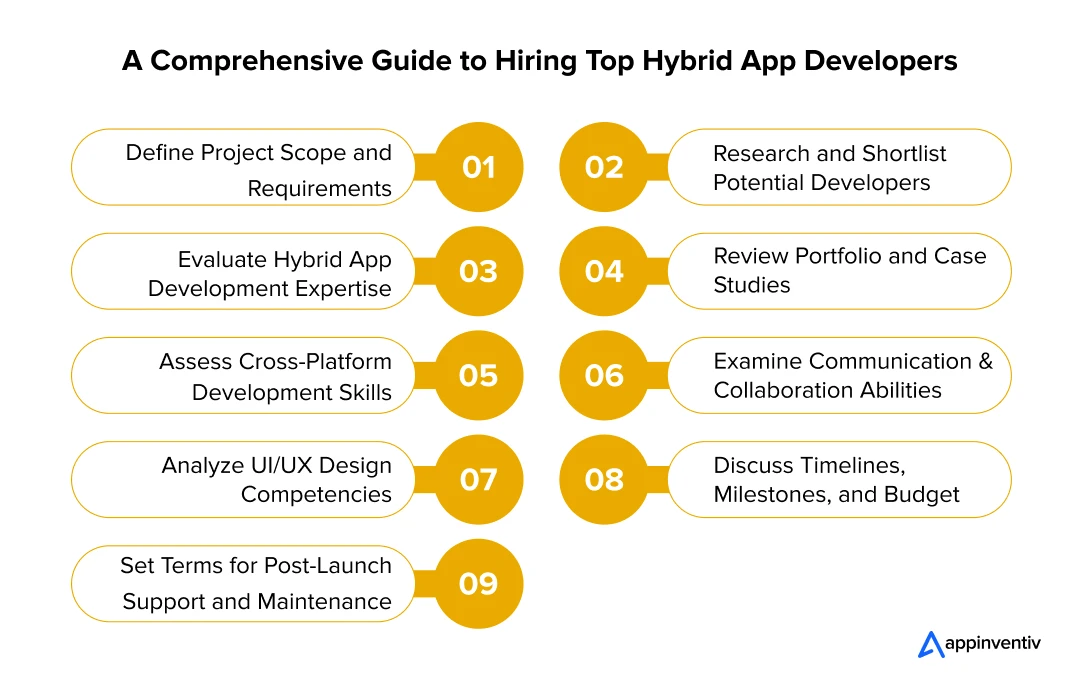
Define Project Scope and Requirements
Outline your app’s objectives, features, and target audience. This clarity will help you communicate your vision effectively. A well-defined scope ensures that when you hire hybrid app developers, they clearly understand your expectations and align their strategy with your business goals from the start.
Research and Shortlist Potential Developers
Look for developers with proven experience in hybrid app development. Use platforms like Clutch or LinkedIn to find credible professionals. Shortlist candidates based on expertise, reviews, and ratings, focusing on those with a track record of delivering high-quality apps.
Evaluate Hybrid App Development Expertise
Assess their knowledge of frameworks like Flutter, React Native, or Ionic. Check their familiarity with integrating cross-platform solutions. When you hire hybrid app developers, ensure they have the expertise to address challenges like device compatibility and efficient coding practices, which are essential for delivering seamless app performance across platforms.
Review Portfolio and Case Studies
Analyze their past work to gauge their style, quality, and innovation. Look for apps similar to your project to ensure compatibility. Also, review case studies to understand how they’ve solved complex problems and delivered value to previous clients.
Assess Cross-Platform Development Skills
Verify their experience in building apps that work seamlessly across iOS and Android. Evaluate how they handle performance optimization and user experience. This ensures your app will provide consistent functionality regardless of the platform or device when you hire hybrid app developers.
Examine Communication and Collaboration Abilities
Ensure they can communicate technical details in simple terms. Strong collaboration skills streamline project workflows and reduce delays. Developers with excellent communication ensure that you stay informed throughout the project lifecycle.
Analyze UI/UX Design Competencies
Check their ability to design visually appealing and user-friendly interfaces. Good design enhances user engagement and app retention. Ask for examples of their design process to ensure they prioritize user-centered designs that reflect your brand identity.
Discuss Timelines, Milestones, and Budget
Before starting, agree on realistic timelines and key deliverables. Discuss a transparent budget to avoid hidden costs for hybrid app developers. Clear milestones provide a roadmap to track progress and ensure timely completion without compromising quality.
Set Terms for Post-Launch Support and Maintenance
Clarify expectations for bug fixes, updates, and scalability. Ensure they offer long-term support for app optimization. Reliable maintenance services guarantee that your app remains competitive and adapts to evolving user needs.
Strategies to Overcome Challenges in Hiring a Hybrid App Developer
Businesses often face challenges such as finding skilled developers, ensuring cost efficiency, and maintaining project timelines. Let’s explore these hurdles in detail and uncover effective strategies to address them for a successful hiring process.
Challenge: Lack of Familiarity with the Latest Hybrid Frameworks
Many developers may not stay up-to-date with the latest hybrid app frameworks like Flutter or React Native. This can result in outdated app features and missed opportunities for enhanced performance.
Solution: To tackle this challenge, ensure the developer is well-versed in the latest hybrid frameworks such as Flutter or React Native. Ask for a portfolio that demonstrates their experience with modern technologies and inquire about their approach to using these frameworks to deliver high-quality, efficient apps.
Challenge: Difficulty in Ensuring Consistent App Performance Across Platforms
Achieving consistent performance across iOS and Android can be tricky due to varying device capabilities and system requirements. Performance issues may arise, leading to a subpar user experience.
Solution: Choose developers with expertise in cross-platform performance optimization. Ask about their strategies for testing app performance across devices and platforms to ensure the app runs smoothly, such as using automated testing tools or fine-tuning the code to handle platform-specific nuances.
Challenge: Managing Complex App Features in Hybrid Development
Hybrid apps may struggle to handle complex features like real-time data syncing or native device integrations. These challenges could impact functionality and app stability.
Solution: Hire developers with a track record of working on feature-rich hybrid apps. Ensure they have experience integrating complex features like native device capabilities, real-time syncing, or advanced UI/UX elements. Evaluate their ability to balance these functionalities without affecting the overall performance when you hire hybrid app developers.
Challenge: Ensuring Scalability and Maintenance After Launch
Post-launch maintenance can become complicated if the app isn’t built with scalability. Over time, adding new features or handling increased traffic can create issues.
Solution: Discuss long-term support during the hiring process and prioritize developers who offer post-launch maintenance. Ensure they plan to scale the app as user demand increases, including easy integration of new features and updates, bug fixes, and improvements based on user feedback.

Unlock Hybrid App Development Excellence with Appinventiv
At Appinventiv, we redefine hybrid app development by combining innovation and expertise to deliver exceptional mobile solutions. Our mobile application development services are designed to create seamless, high-performing apps that cater to your business’s unique needs.
Streamlined Development Process: We follow a structured and efficient approach to ensure your hybrid app is developed precisely and meets all quality benchmarks.
Experienced Team of 1600+ Experts: Our talented professionals bring diverse expertise, ensuring your project is in capable hands.
Cutting-Edge Technology: We leverage the latest tools and frameworks to deliver innovative, high-performing hybrid apps.
Market Trends Integration: Our solutions are aligned with the latest market trends to ensure your app stays competitive and relevant.
Comprehensive Research Methodology: We conduct in-depth research to understand your target audience and business needs, delivering tailor-made app solutions.
Experience the difference with Appinventiv and unlock unparalleled excellence in hybrid app development.
FAQs
Q. How much does it cost to hire a hybrid app developer?
A. The cost of hiring a hybrid app developer varies depending on location, experience, and project complexity. On average, hybrid app developers cost ranges between $25 to $100 per hour. For example, developers in regions like the US or UK typically charge higher rates (around $60 to $100 per hour) than developers in Asia or Eastern Europe, where rates range from $25 to $50 per hour. The total hybrid app development cost also depends on the duration and scope of your app development project.
Q. What are the benefits of hiring a hybrid mobile app developer?
A. The advantages of hiring a hybrid mobile app developer are plentiful, making it a smart and efficient choice for businesses seeking versatile app solutions. These developers specialize in creating cross-platform applications that work seamlessly on iOS and Android using a single codebase, reducing development time and hybrid app development cost.
With expertise in advanced frameworks like Flutter, React Native, and Ionic, they can deliver high-performance apps with visually appealing designs. Additionally, hybrid apps are easier to maintain, as updates and bug fixes can be applied to all platforms.
Q. What are the common mistakes to avoid when you hire hybrid mobile app developers?
A. Here are some common mistakes to avoid when you hire a hybrid mobile app developer:
- Focusing solely on cost: Prioritizing low cost over skills and experience can compromise the quality of your app, leading to additional expenses in the long run.
- Overlooking platform expertise: Ensure the developer has a strong grasp of hybrid frameworks like Flutter, React Native, or Ionic to deliver efficient cross-platform solutions.
- Neglecting communication skills: Poor communication can result in misunderstandings and delays, especially in complex projects with specific requirements.
- Skipping portfolio evaluation: Failing to review the developer’s past projects and client feedback can leave you unaware of their technical proficiency and reliability.
Product Development & Engineering
IT Managed & Outsourcing
Consulting Services
Data Services
Didn't find what you're looking for? Let us know your needs, and we'll tailor a solution just for you.




